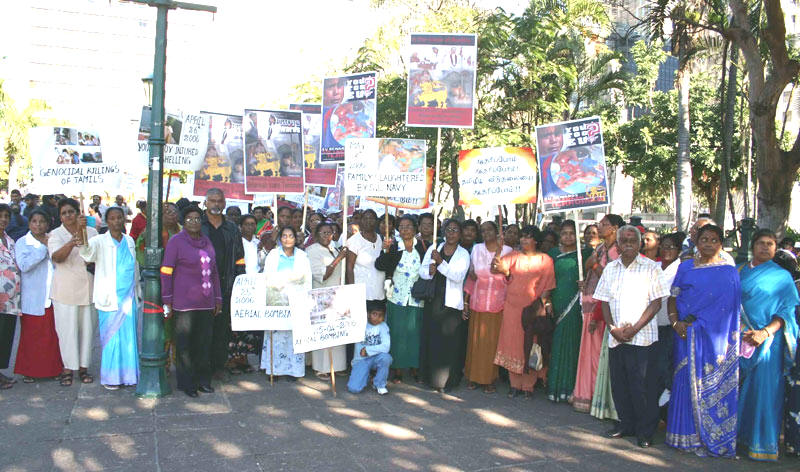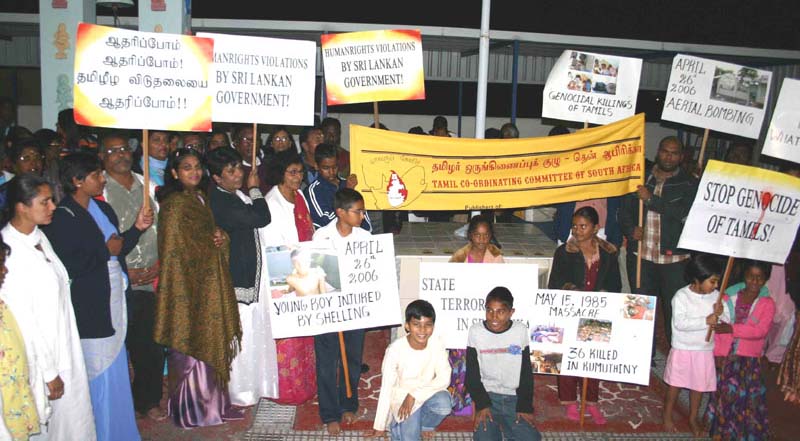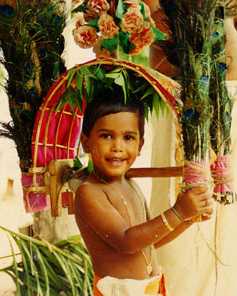| South Africa - தென்னாபிரிக்கா
- an estimated 250,000 Tamils live in South Africa -
about 70% in Kwazulu-Natal
| Durban Tamils protest against Sri Lanka's Rights violations
[TamilNet, June 24, 2006 ]
Representatives of the Tamil Co-ordinating Committee of South Africa (TCC), members of organizations supporting human rights in South Africa, and expatriate Tamils staged a peaceful march and placard demonstration in front of the Durban City Hall, South Africa Friday 23rd June 2006. More than 200 people protested the human rights violations of the Sri Lanka Government against Tamil civilians and European Union’s proscription of the LTTE, organizers of the event said.
Protesters carried placards and shouted slogans highlighting the human rights violations, including the recent murder of civilians in Mannar and Jaffna, carried out by the Sri Lankan armed forces. This demonstration was organized by Tamil Co-ordinating Committee of South Africa (TCC).
| | South African Tamils join protest against EU ban, 29 May 2006 
[see also Tamils demonstrate in Australia, Canada, France, Germany,
Switzerland, Netherlands, Norway, Sweden, Finland, Italy]
Hundreds of Tamils braved the cold winter evening in Durban South Africa to joined in solidarity with fellow Tamils across the world Monday to voice their objection to the impending ban of Liberation Tigers by the European Union. The protest demonstration was held at the Magazine Barracks Temple, Durban was organized by the Tamil Co-ordinating committee of South Africa.
Concerned Tamils and supporters of human rights held placards in silence. The placards highlighted the human rights violations by the Sri Lankan Government and demanded that the Government of Sri Lanka stop the Genocide of Tamils in Sri Lanka.
A memorandum was handed to Dr K.V Moodley, who attended as a representative of the department of Foreign Affairs of South Africa.
The memorandum was an appeal to the foreign affairs ministry of South Africa to assist in finding a peaceful resolution to the conflict in Northeast Sri Lanka.
Dr KV Moodley, a stalwart of the African National Congress (ANC) assured all present that the memorandum will reach the Foreign Ministry and that the ANC as well as the Government of South Africa will make every effort to assist in the resolution of the conflict in Sri Lanka.
| Tamil Hindus in KawZulu-Natal (South Africa):
History, Identity and the Establishment of Their Place in the New South Africa
Alleyn Diesel (University of Natal at Pietermaritzburg, South Africa)
Paper presented at 18th Congress of the International Association for the History of Religions (IAHR),
5.-12. August 2000, Durban (South Africa)
"The language groups represented among the Hindu immigrants who came from India to Natal, South Africa, from 1860 onwards, are Tamil, Telugu, Hindi, and Gujarati, with Tamil people forming the majority. After the expiry of their indentures most of these Indians moved to the cities, becoming established as a thoroughly urban population. However, because of the apartheid system the majority tended to remain poor, with few opportunities for improvement. The forced removals programme caused great disruption, and social hardship for Indian people. The extended family system was largely destroyed, with negative consequences for many, resulting in various social problems. Apartheid seriously alienated all Indians as disenfranchised "non-whites", and Hinduism in particular was perceived by many whites as antithetical to Christianity. However, numerous Tamil cultural organisations are presently helping people to recover knowledge of the vernacular, and to take pride in their ancient and rich tradition. For many individual Hindus, a new awareness of their Tamil heritage could be powerfully inspirational and healing. Within the new democratic SA many are also beginning to feel comfortable with their SA citizenship, although, for many, there are still strong feelings of uncertainty about not benefiting sufficiently from the recent democratic initiatives, and their knowledge that the Indian community will continue to be a minority. Over the 140 years of residence in South Africa, participation in religion and its many festivals has brought devotees a valuable sense of identity and solidarity, especially in the light of their marginalization and the discrimination experienced under the apartheid system. A recent resurgence of interest in indigenous Tamil/Dravidian festivals seems to reflect a variety of religious, social and political concerns. It is possible that this Tamil "renaissance" could have both positive and negative effects on the integration of this community into the larger SA society."
| | Kavadi in the South African Cult of Murukan - Dr. Sarres Padayachee (abstract of paper presented at the Third Murukan Conference, Kuala Lumpur 2-5 November 2003)  The indentured Indians who left India, the cradle of Hindu culture and mother of Hindu tradition, arrived in South Africa during the second half of the 19th Century. They brought with them a historic culture which was distinct from the dominant Western and indigenous black cultures in modes of worship and philosophy. Thus were the seeds of Hindu religio-cultural expression, which embraced a plethora of oral traditions, rituals and festivals, transplanted into a fecund African and colonial environment. The indentured Indians who left India, the cradle of Hindu culture and mother of Hindu tradition, arrived in South Africa during the second half of the 19th Century. They brought with them a historic culture which was distinct from the dominant Western and indigenous black cultures in modes of worship and philosophy. Thus were the seeds of Hindu religio-cultural expression, which embraced a plethora of oral traditions, rituals and festivals, transplanted into a fecund African and colonial environment.
Despite their lack of literacy and schooling, the influences of Western and other cultures, the strictures and obstructions of the colonial and apartheid eras, and a profusion of socio-political and economic difficulties, these custodians of Hindu culture have retained their identity. These pioneers could not have imagined how their simple wood and iron temples would mushroom into major religious monuments symbolizing ultimate enlightenment.
Their committed perseverance gave rise to the birth of many Murugan temples which today stand as beacons of Hindu culture catering for the religious needs of the Murugan worshippers in the Kwa Zulu-Natal, Gauteng and Cape Provinces of South Africa. Amongst the many Murugan Temples in South Africa, the Sri Siva Soobramaniar Temple in Brake Village, Tongaat, and the Shree Siva Subramaniar Temple in Melrose truly enjoy the status of "pilgrim centres" where devotees assemble to pay homage to Lord Muruga.
Today, 142 years later, the unbroken continuity of the Murugan cult in South Africa has become an important component of popular Hinduism. This is evidenced when a vast assembly of Murugan worshippers from all walks of life gather to pay obeisance to Lord Muruga and fulfill their vows during the Tai Pucam, Sithiraa Paruvam and Punkuni Uttiram Kavadi festivals. The growing popularity of the Kavadi festivals also attracts observers from other ethnic milieus in a multi-cultural South Africa, including devotees from the black community. Devotees ascribe the growth of kavadi to the benefits that the kavadi bearer experiences in the form of better health, which many call a "new life", spiritual attainment and material prosperity.
This paper will investigate the Murugan cult in South Africa with special emphasis on the kavadi ritual as practiced at two historic temples viz. The Panguni Uththiram Kavady Festival as practised at the Sri Siva Soobramaniar Temple in Brake Village, Tongaat, KwaZulu-Natal and the Tai Pucam Kavady Festival as practised at the Shree Siva Subramaniar Temple in Melrose, Gauteng. In this context the pre-Kavady rituals, the main kavadi festival and the post-kavadi rituals will be dealt with. The paper will also include a brief synopsis of Skanda Sasthi as well as other Murugan cult practices not undertaken at the above-mentioned temples. The presentation will include visual information on the important Murugan shrines found in South Africa. A documentary video-recording of the kavadi festival and its component rituals as practiced at Brake Village will form part of the presentation.
|
|
![]()